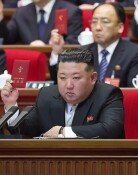Russia Honors Korean Community Leader
Russia Honors Korean Community Leader
Posted April. 21, 2006 02:59,
Vassili Cho, the chairperson of the Association of Ethnic Koreans in Russia who was awarded the Russian governments friendship decoration on Wednesday, said, Following the Korean government, the Russian government awarded this decoration to me. I accept this as an encouragement for me to work harder to strengthen the friendship between the two countries.
On behalf of Russian President Vladimir Putin, Russias Minister of Culture and Mass Communications Alexander Sokolov conferred the decoration to Cho.
In February 2003, the Korean government also awarded Cho a national decoration for his contribution to the development of the ethnic Korean community in Russia.
Even though there have been a few cases of Koreans living in South Korea and North Korea being granted the decoration from the Russian government because of diplomatic concerns, it is the first time that an ethnic Korean living in Russia has been awarded the decoration.
At a celebration ceremony, Vladimir Lee, 76, a professor at the Russian Diplomatic Academy, said, This is a very significant achievement we have made since 1909. This statement is grounded on the fact that the Tsar Nicholas II of the Russian Empire awarded Lee Beom-jin (1852~1911) the supreme Stanislavaky decoration in 1909. Lee stayed in Russia at that time as an exile.
Lee Beom-jin was the first Korean minister to Russia. After the Korea-Japan Protocol in 1905 which deprived Lee of the right as diplomatic official, Japan ordered him to come back to the Korea. But Lee ignored the order and stayed in the Russia to continue his duty as minister. To encourage his resistance, the Tsar conferred on him this decoration.
In 1910, a year after Japanese annexation of Korea, Lee committed suicide to resist the Japanese occupation of the Korean peninsula.
Yulia Pisculova, 35, a descendant of Lee, visited the cerebrating ceremony and made the event more meaningful.
In 1999, Cho assumed the presidency of the association and has developed this organization as the hub of ethnic Korean community in Russia. The Association of Ethnic Koreans in Russia is the most active organization among approximately 60 other ethnic organizations located in Russia now.
For example, the association established a Korean hall with financial support from the two governments. In addition to this, to celebrate the 140th anniversary of Korean emigration to Russia, the association organized large-scale events after gaining acknowledgement from the Russian government of the historical significance of its Korean community. The Russian governments national budget was even assigned to support the financing of this event.
Cho started his career as an engineer and also worked as a manager of a fabric factory. From 1989 to 1992, Cho served as a representative of the Peoples Supreme Council of the Soviet Union.
kimkihy@donga.com







